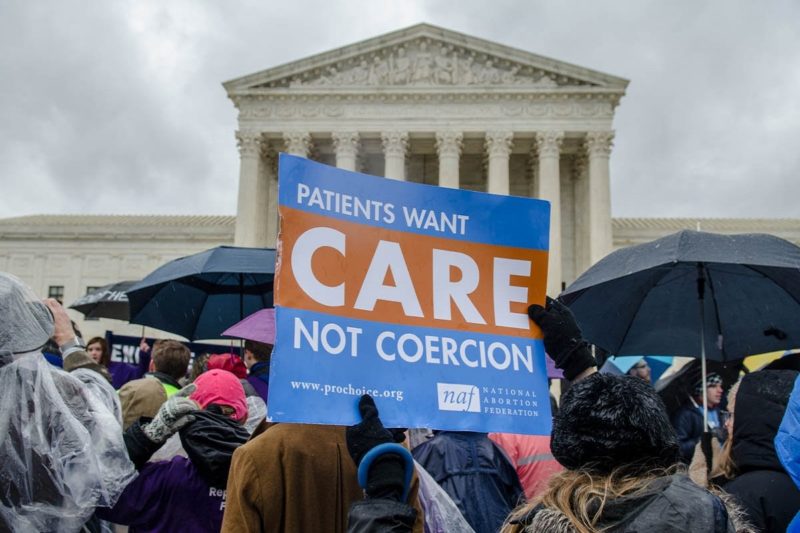The Supreme Court Sided With Fake Clinics in California. The Fallout Could Spread Nationwide.
An attorney for the Alliance Defending Freedom said the group would go after fake clinic regulations passed by Democrats in Illinois and Hawaii.

Abortion rights foes hope their recent U.S. Supreme Court victory in a case involving California’s regulation of fake clinics, or crisis pregnancy centers (CPCs), will soon topple similar laws in Hawaii and Illinois.
Supreme Court justices ruled in a 5-4 decision last week in National Institute of Family and Life Advocates (NIFLA) v. Becerra that fake clinics were likely to prevail on their argument that the California law violates the First Amendment.
At stake was a 2015 law requiring licensed centers to disclose how pregnant people can access all their options—including abortion care—through state programs, and requiring unlicensed facilities to disclose that fact. The ruling overturns a decision by the U.S. Court of Appeals for the Ninth Circuit and sends the case back to the courts.
Now, an attorney for the Alliance Defending Freedom (ADF), the conservative Christian legal defense organization that argued on behalf of NIFLA, said it intends to ask the courts next week to strike down similar laws in other states. The laws regulate fake clinics, often staffed by anti-choice activists who use deceptive tactics to dissuade people from seeking abortion services.
“We will be asking courts in Illinois and Hawaii to apply the NIFLA ruling to strike down compelled speech laws in both states,” ADF attorney Kevin Theriot said in a statement to Rewire.News.
Court challenges, and the Supreme Court decision, have held up the Illinois and Hawaii laws. Status reports are now due by July 9 to Hawaii U.S. District Court Judge Derrick K. Watson and by July 10 to Illinois U.S. District Court Judge Iain D. Johnston.
Representatives from the attorneys general offices in Illinois and Hawaii, among the defendants in the cases, did not immediately respond to a request for comment on the state’s position.
The laws in both states had taken aim at religiously affiliated facilities and crisis pregnancy centers, and provoked controversy—pitting health-care providers, who contend that fake clinics peddle anti-choice misinformation, against religious groups that argue the facilities are an exercise of their faith.
Passed in 2016, the Illinois law requires health care providers with religious objections to abortion to refer patients to providers where they may get the service, if the patient requests that information. The ADF filed suits in state and federal court to block the law, Theriot said.
The Hawaii law requires “limited service pregnancy centers,” a category that includes fake clinics, to provide information about state programs offering free and low-cost family planning services and to follow state and federal patient privacy laws.
That Democratic-passed law was swiftly challenged in court. A Place for Women in Waipio, a fake clinic, and NIFLA claimed the law violated the facilities’ First Amendment rights to free speech and free exercise of religion, according to a complaint filed last summer.
But abortion rights supporters noted that the chief aim of the religiously affiliated facilities is to stop abortions, and the staff there, under the guise of medical care, actually delay health care and peddle mistruths to achieve this aim. Peer-reviewed research and both federal and independent investigations have caught fake clinic staff dispensing unscientific information on abortion risks.
Reports of the centers’ deceptive tactics helped spur the passage of California’s Reproductive Freedom, Accountability, Comprehensive Care, and Transparency (FACT) Act in 2015. But that evidence didn’t sway the majority of justices in last week’s NIFLA v. Becerra decision.
Writing for the majority, Justice Clarence Thomas maintained the FACT Act “targets speakers, not speech, and imposes an unduly burdensome disclosure requirement that will chill their protected speech.”
Responding to the high court’s decision, Assemblyperson Autumn Burke (D-Los Angeles), one of the co-authors of the California law, said in a recent press conference the decision sets a “dangerous precedent.” She struck a defiant note.
“We politely asked crisis pregnancy centers to lie less and that didn’t work, so I guess we are going to have to be a little less polite the next time,” Burke said.
